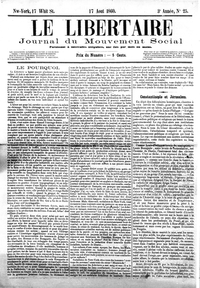User:Eduen/Libertarian Communism
Libertarian Communism[edit]
The french anarchist communist Joseph Déjacque was the first person to describe himself as "libertarian".[1] Unlike the mutualist anarchist Pierre Joseph Proudhon, he argued that, "it is not the product of his or her labor that the worker has a right to, but to the satisfaction of his or her needs, whatever may be their nature."[2][3] According to the anarchist historian Max Nettlau, the first use of the term libertarian communism was in November 1880, when a French anarchist congress employed it to more clearly identify its doctrines.[4] The French anarchist journalist Sébastien Faure, later founder and editor of the four-volume Anarchist Encyclopedia, started the weekly paper Le Libertaire (The Libertarian) in 1895.[5]

The term anarchist communism was first formulated as such in the Italian section of the First International.[6] The theoretical work of Peter Kropotkin took importance later as it expanded and developed pro-organizationalist and insurrectionary anti-organizationalist sections.[7] Anarchist communism as a coherent, modern economic-political philosophy was first formulated in the Italian section of the First International by Carlo Cafiero, Emilio Covelli, Errico Malatesta, Andrea Costa and other ex-Mazzinian Republicans.[6] Anarchist communism is a theory of anarchism which advocates the abolition of the state, markets, money, capitalism and private property (while retaining respect for personal property)[8], and in favor of common ownership of the means of production,[9][10] direct democracy and a horizontal network of voluntary associations and workers' councils with production and consumption based on the guiding principle: "from each according to his ability, to each according to his need".[11][12]
During the early 20th century "The terms libertarian communism and anarchist communism thus became synonymous within the international anarchist movement as a result of the close connection they had in Spain (see Anarchism in Spain) (with libertarian communism becoming the prevalent term)."[13][14] In 1926 "a group of exiled Russian anarchists in France, the Delo Truda (Workers' Cause) group, published this pamphlet. It arose not from some academic study but from their experiences in the 1917 Russian revolution."[15]
To date, the best-known examples of an anarchist communist society (i.e., established around the ideas as they exist today and achieving worldwide attention and knowledge in the historical canon), are the anarchist territories during the Spanish Revolution[16] and the Free Territory during the Russian Revolution. Through the efforts and influence of the Spanish Anarchists during the Spanish Revolution within the Spanish Civil War, starting in 1936 anarchist communism existed in most of Aragon, parts of the Levante and Andalusia, as well as in the stronghold of Anarchist Catalonia before being crushed by the combined forces of the regime that won the war, Hitler, Mussolini, Spanish Communist Party repression (backed by the USSR) as well as economic and armaments blockades from the capitalist countries and the Spanish Republic itself.[17] During the Russian Revolution, anarchists such as Nestor Makhno worked to create and defend—through the Revolutionary Insurrectionary Army of Ukraine—anarchist communism in the Free Territory of the Ukraine from 1919 before being conquered by the Bolsheviks in 1921>[18]. The Manifesto of Libertarian Communism was written in 1953 by Georges Fontenis for the Federation Communiste Libertaire of France. It is one of the key texts of the anarchist-communist current known as platformism[19].
- ^ Joseph Déjacque, De l'être-humain mâle et femelle - Lettre à P.J. Proudhon par Joseph Déjacque (in French)
- ^ Cite error: The named reference
Graham-2005was invoked but never defined (see the help page). - ^ "l'Echange", article in Le Libertaire no 6, September 21, 1858, New York. [1]
- ^ Nettlau, Max (1996). A Short History of Anarchism. Freedom Press. p. 145. ISBN 0-900384-89-1.
- ^ Nettlau, Max (1996). A Short History of Anarchism. Freedom Press. p. 162. ISBN 0-900384-89-1.
- ^ a b Nunzio Pernicone, "Italian Anarchism 1864 - 1892", pp. 111-113, AK Press 2009.
- ^ Cite error: The named reference
Alain Pengamwas invoked but never defined (see the help page). - ^ "The revolution abolishes private ownership of the means of production and distribution, and with it goes capitalistic business. Personal possession remains only in the things you use. Thus, your watch is your own, but the watch factory belongs to the people."[2] Alexander Berkman. "What Is Communist Anarchism?"
- ^ From Politics Past to Politics Future: An Integrated Analysis of Current and Emergent Paradigms Alan James Mayne Published 1999 Greenwood Publishing Group 316 pages ISBN 0-275-96151-6. Books.google.com. 1999. ISBN 978-0-275-96151-0. Retrieved 2010-09-20.
- ^ Anarchism for Know-It-Alls By Know-It-Alls For Know-It-Alls, For Know-It-Alls. Filiquarian Publishing, LLC. 2008-01. ISBN 978-1-59986-218-7. Retrieved 2010-09-20.
{{cite book}}: Check date values in:|date=(help) - ^ Fabbri, Luigi. "Anarchism and Communism." Northeastern Anarchist #4. 1922. 13 October 2002. http://dwardmac.pitzer.edu/anarchist_archives/worldwidemovements/fabbrianarandcom.html
- ^ Makhno, Mett, Arshinov, Valevski, Linski (Dielo Trouda). "The Organizational Platform of the Libertarian Communists". 1926. Constructive Section: available here http://www.nestormakhno.info/english/platform/constructive.htm
- ^ "Anarchist Communism & Libertarian Communism" by Gruppo Comunista Anarchico di Firenze. from "L'informatore di parte", No.4, October 1979, quarterly journal of the Gruppo Comunista Anarchico di Firenze
- ^ "Anarchist communism is also known as anarcho-communism, communist anarchism, or, sometimes, libertarian communism.""Anarchist communism - an introduction" by Libcom.org
- ^ "The Organizational Platform of the Libertarian Communists" by Delo Truda
- ^ "This process of education and class organization, more than any single factor in Spain, produced the collectives. And to the degree that the CNT-FAI (for the two organizations became fatally coupled after July 1936) exercised the major influence in an area, the collectives proved to be generally more durable, communist and resistant to Stalinist counterrevolution than other republican-held areas of Spain." [3] Murray Bookchin. To Remember Spain: The Anarchist and Syndicalist Revolution of 1936
- ^ [4] Murray Bookchin. To Remember Spain: The Anarchist and Syndicalist Revolution of 1936
- ^ Charles Townshend, John Bourne, Jeremy Black (1997). The Oxford Illustrated History of Modern War. Oxford University Press. ISBN 0-19-820427-2.
{{cite book}}: CS1 maint: multiple names: authors list (link) - ^ "Manifesto of Libertarian Communism" by Georges Fontenis
